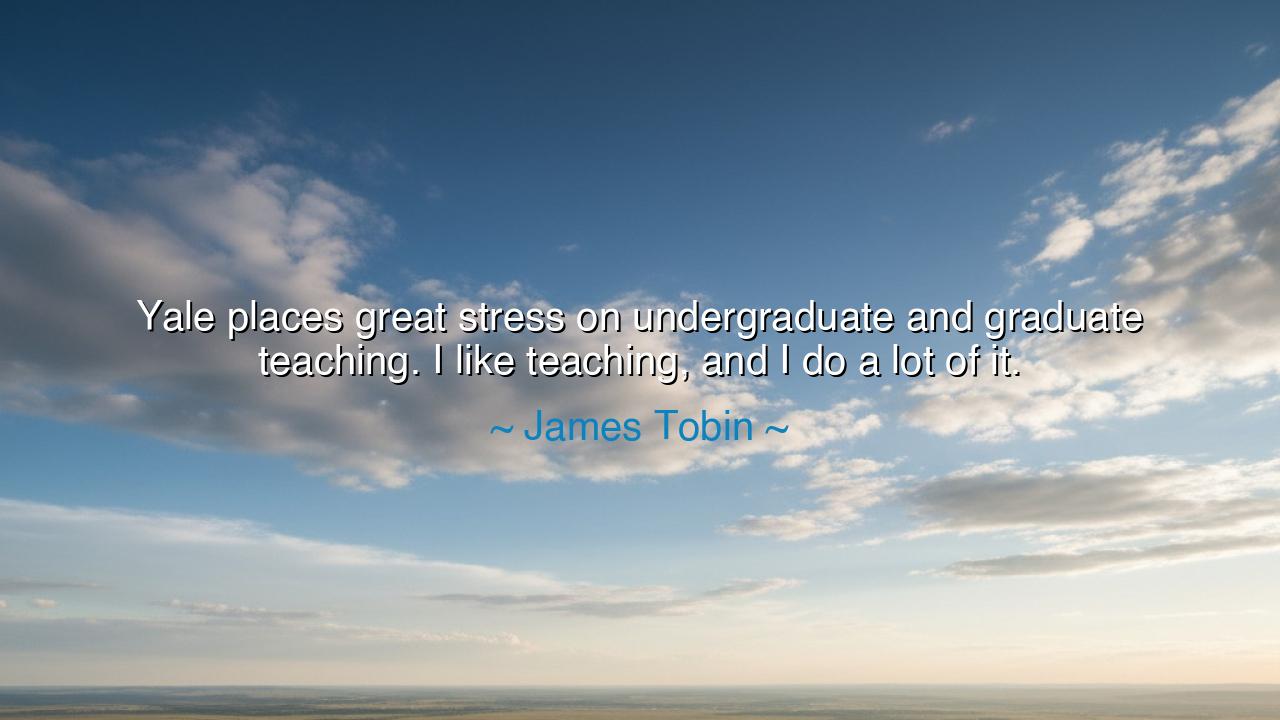
Yale places great stress on undergraduate and graduate teaching.
Yale places great stress on undergraduate and graduate teaching. I like teaching, and I do a lot of it.






The words “Yale places great stress on undergraduate and graduate teaching. I like teaching, and I do a lot of it” spoken by James Tobin reflect a profound truth about the enduring value of education, mentorship, and the cultivation of knowledge. Beneath their simplicity lies a timeless principle: that teaching is not merely a profession, but a sacred act of transmission, guidance, and shaping of minds. Tobin reminds us that the measure of an institution, and indeed of a scholar, is found not solely in research or personal achievement, but in the dedication to fostering understanding in others.
In the style of the ancients, one might hear echoes of Socrates, Plato, and Aristotle, who regarded teaching as the highest calling. Socrates wandered the streets of Athens, engaging in dialogue with the young and old alike, demonstrating that wisdom grows when shared. Tobin’s commitment to teaching reflects the same ethos: knowledge achieves its highest purpose when it is communicated, interrogated, and absorbed by others, forming the basis of future thought, action, and innovation.
The origin of this insight lies in Tobin’s life as an economist and scholar. At Yale, an institution that emphasizes rigorous undergraduate and graduate instruction, Tobin immersed himself in the role of mentor, lecturer, and guide. His dedication exemplifies the symbiosis between teacher and student: by engaging deeply with learners, the teacher hones their own understanding while fostering insight and critical thinking in those they instruct. Tobin’s words remind us that teaching is both a duty and a privilege, a conduit through which knowledge extends across generations.
History offers examples that illuminate this truth. Consider Leonardo da Vinci’s pupils, who not only absorbed artistic and scientific methods but also carried forward his innovative spirit, reshaping art, engineering, and anatomy. Likewise, Isaac Newton’s mentorship of young scientists allowed his insights to echo across centuries, ensuring that the foundations of physics and mathematics would endure. Like Tobin, these figures understood that teaching multiplies the value of knowledge, extending the reach of one mind across time and space.
Tobin’s statement also underscores the moral and social responsibility inherent in education. Teaching is not simply the conveyance of facts; it is the cultivation of judgment, curiosity, and ethical understanding. By committing to both undergraduate and graduate teaching, Tobin demonstrates that every level of learning matters, and that the development of thoughtful, informed individuals strengthens both the academy and society at large. His practice reminds us that teaching is a vital instrument in shaping not only intellect but character.
Dear listener, the lesson is enduring: embrace the role of teacher and mentor wherever possible. Knowledge gains its power not when hoarded, but when shared. Whether in formal classrooms, informal discussion, or personal guidance, the act of teaching elevates both giver and receiver, forging understanding, insight, and wisdom that reverberates beyond the individual. Tobin teaches that the legacy of a scholar is measured not merely by discovery, but by the minds they shape and the questions they ignite.
Take this wisdom into your own life: seek opportunities to instruct, to mentor, and to guide others, regardless of scale. Value clarity, patience, and engagement, understanding that the act of teaching refines your own knowledge while empowering others to think critically, creatively, and independently. Through teaching, you participate in the perpetuation and expansion of human understanding, leaving a legacy that extends far beyond personal achievement.
Finally, let James Tobin’s words resonate as both encouragement and inspiration: the highest purpose of learning is to share it, to awaken minds and cultivate intellect across generations. Institutions like Yale thrive because of such dedication, but individuals carry the same capacity within their own spheres. By committing to teaching, whether formally or informally, we ensure that knowledge is not static, but alive — a living inheritance for all who seek to understand, to act, and to contribute to the flourishing of society.






AAdministratorAdministrator
Welcome, honored guests. Please leave a comment, we will respond soon